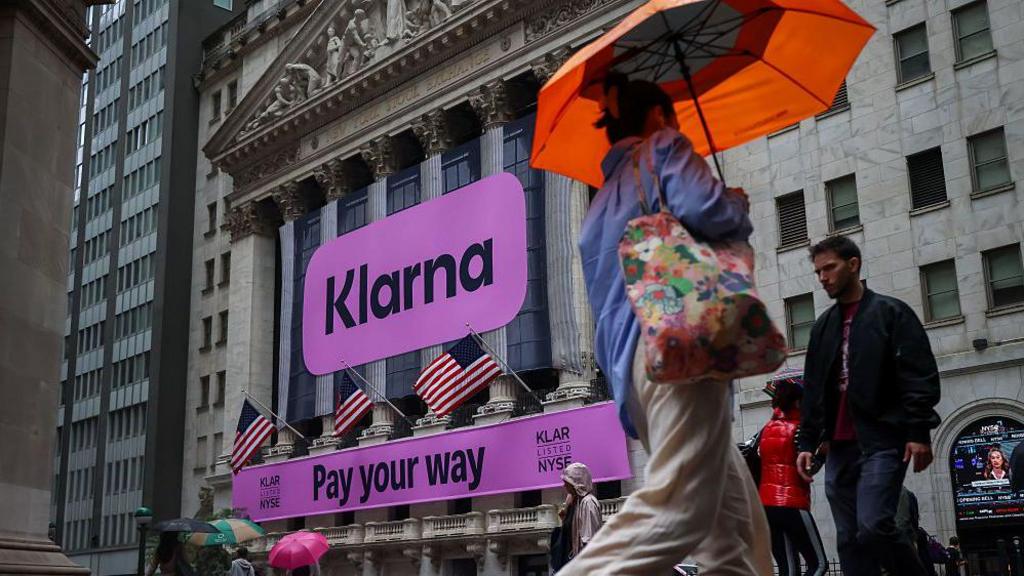“`html
Klarna, the buy-now, pay-later (BNPL) provider, saw its shares surge upon its US public market debut, valuing the company at over $19 billion (£14 billion).
This marks a significant achievement for the Swedish financial technology firm, which has positioned itself as a disruptive force challenging traditional credit card companies and banking institutions.
Established in 2005, Klarna is recognized for its service enabling consumers to divide purchases into smaller, interest-free payments. This offering has resonated with a substantial user base of approximately 93 million active consumers across 26 countries.
However, the company’s business model has faced scrutiny regarding the potential for encouraging consumers to overextend their spending.
In the past year, Klarna facilitated transactions totaling $105 billion. A major player in the global retail landscape, the company expanded into the UK market in 2014 and the US market in 2019.
Company data indicates that more than 80% of adults in Sweden utilized Klarna’s services last year.
In a statement to employees, CEO Sebastian Siemiatkowski conveyed that this milestone would serve as “fuel” for the company’s expansion efforts in additional markets.
Through its initial public offering (IPO), Klarna raised $1.37 billion by offering shares at $40 each. The offering also provided an opportunity for early investors, including the prominent US venture capital firm Sequoia Capital, to realize gains on their investments.
Trading commenced at $52 per share, representing a 30% increase from the IPO price, which had previously valued the company at $15 billion.
Despite this positive market reception, the company’s valuation remains below its 2021 peak, when an investment by Softbank Group valued Klarna at over $45 billion. Subsequent economic headwinds and rising interest rates have impacted the company’s valuation.
Joachim Dal, a partner at GP Bullhound Investment Management, suggested that investors may have misconstrued Klarna’s core business, which primarily generates revenue through fees charged to sellers for transactions utilizing its BNPL service.
Speaking on the BBC’s Opening Bell program, Dal stated, “In our view it’s more of a payment company than a lender,” highlighting the “very low” rates of late payments. “It’s more about facilitating a smooth experience on the payment side than about providing credit to consumers.”
Klarna reported revenues of $2.8 billion last year, marking a 24% year-on-year increase.
However, the company’s profitability has been negatively impacted by higher transaction processing costs in the US market.
For the three months ending in June, Klarna reported a $52 million loss, an increase from $7 million in the same period last year.
Klarna has been considering a public offering for several years. An initial plan to launch in April was postponed due to market uncertainty following US tariff announcements.
Since then, US equity markets have recovered, with major indices reaching record highs.
Several other companies, including cryptocurrency firm Gemini, are reportedly planning public offerings this week, aiming to capitalize on the current market conditions.
Dal commented, “For any company in the technology sector that is looking to go public, there is only one market and that is the market on Wall Street.”
“That’s where you have the most liquidity, most of the coverage of equity analysts that’s where you have most of the comparable companies listed and frankly you get the highest valuations as well.”
A debt charity tells BBC Newsbeat using the schemes is almost as common as going into an overdraft.
The buy now pay later firm plans to axe around 700 workers ahead of a “likely recession”.
The buy-now-pay later firm will share payment habits which could help or hinder credit applications.
Providers will make terms and conditions clearer amid concerns consumers could be at risk.
Interest in buy now pay later options is surging, with growth fastest among users in their 40s and 50s.
“`

